

| Supreme Court of the United States | |
|---|---|
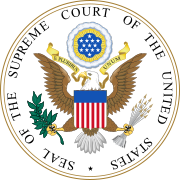 | |
 | |
| 38°53′26″N 77°00′16″W / 38.89056°N 77.00444°W / 38.89056; -77.00444 | |
| Established | March 4, 1789; 235 years ago (1789-03-04)[1] |
| Location | Washington, D.C. |
| Coordinates | 38°53′26″N 77°00′16″W / 38.89056°N 77.00444°W / 38.89056; -77.00444 |
| Composition method | Presidential nomination with Senate confirmation |
| Authorized by | Constitution of the United States |
| Judge term length | Life tenure |
| Number of positions | 9 (by statute) |
| Website | supremecourt |
| Chief Justice of the United States | |
| Currently | John Roberts |
| Since | September 29, 2005; 18 years ago (2005-09-29) |
| This article is part of a series on the |
| Supreme Court of the United States |
|---|
 |
| The Court |
| Current membership |
|
| Lists of justices |
|
| Court functionaries |
|
|
This is a list of the 44 cases reported in volume 41 (16 Pet.) of United States Reports, decided by the Supreme Court of the United States from January 1842 to March 1842.[2]
In 1874, the U.S. government created the United States Reports, and retroactively numbered older privately-published case reports as part of the new series. As a result, cases appearing in volumes 1–90 of U.S. Reports have dual citation forms; one for the volume number of U.S. Reports, and one for the volume number of the reports named for the relevant reporter of decisions (these are called ”nominative reports”).
Starting with the 26th volume of U.S. Reports, the Reporter of Decisions of the Supreme Court of the United States was Richard Peters, Jr. Peters was Reporter of Decisions from 1828 to 1843, covering volumes 26 through 41 of United States Reports which correspond to volumes 1 through 16 of his Peter’s Reports. As such, the dual form of citation to, for example, Nixdorff v. Smith is 41 U.S. (16 Pet.) 132 (1842).
The Supreme Court is established by Article III, Section 1 of the Constitution of the United States, which says: ”The judicial Power of the United States, shall be vested in one supreme Court . . .”. The size of the Court is not specified; the Constitution leaves it to Congress to set the number of justices. Under the Judiciary Act of 1789 Congress originally fixed the number of justices at six (one chief justice and five associate justices).[3] Since 1789 Congress has varied the size of the Court from six to seven, nine, ten, and back to nine justices (always including one chief justice). When the cases in 41 U.S. (16 Pet.) were decided the Court comprised these nine justices:
| Portrait | Justice | Office | Home State | Succeeded | Date confirmed by the Senate (Vote) |
Tenure on Supreme Court |
|---|---|---|---|---|---|---|
 |
Roger B. Taney | Chief Justice | Maryland | John Marshall | March 15, 1836 (29–15) |
March 28, 1836 – October 12, 1864 (Died) |
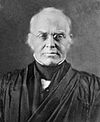
|
Joseph Story |
Associate Justice | Massachusetts | William Cushing | November 18, 1811 (Acclamation) |
February 3, 1812 – September 10, 1845 (Died) |
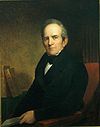 |
Smith Thompson | Associate Justice | New York | Henry Brockholst Livingston | December 9, 1823 (Acclamation) |
September 1, 1823 – December 18, 1843 (Died) |
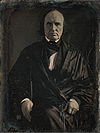 |
John McLean | Associate Justice | Ohio | Robert Trimble | March 7, 1829 (Acclamation) |
January 11, 1830 – April 4, 1861 (Died) |
 |
Henry Baldwin | Associate Justice | Pennsylvania | Bushrod Washington | January 6, 1830 (41–2) |
January 18, 1830 – April 21, 1844 (Died) |
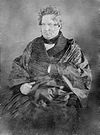 |
James Moore Wayne | Associate Justice | Georgia | William Johnson | January 9, 1835 (Acclamation) |
January 14, 1835 – July 5, 1867 (Died) |
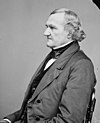 |
John Catron | Associate Justice | Tennessee | newly-created seat | March 8, 1837 (28–15) |
May 1, 1837 – May 30, 1865 (Died) |
 |
John McKinley | Associate Justice | Alabama | newly-created seat | September 25, 1837 (Acclamation) |
January 9, 1838 – July 19, 1852 (Died) |
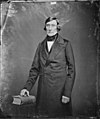 |
Peter Vivian Daniel | Associate Justice | Virginia | Philip P. Barbour | March 2, 1841 (25–5) |
January 10, 1842 – May 31, 1860 (Died) |

InSwift v. Tyson, 41 U.S. (16 Pet.) 1 (1842), the US Supreme Court determined that United States federal courts hearing diversity jurisdiction cases under the Judiciary Act of 1789 must apply statutory state laws when the state legislature in question had spoken on the relevant issue, but need not apply the a state’s common law if the state’s legislature had not spoken on the issue. The decision meant that the federal courts deciding matters not specifically addressed by a state legislature had the authority to develop a federal common law.
InPrigg v. Pennsylvania, 41 U.S. (16 Pet.) 539 (1842), the US Supreme Court held that the federal Fugitive Slave Act of 1793 pre-empted a state law that made it a crime to take blacks out of the free state of Pennsylvania and into slavery elsewhere. Also, by refusing to take judicial notice of the problem of free blacks being kidnapped in free states and sold into slavery, Prigg implied that blacks were entitled to fewer procedural protections than were whites.[4]
Under the Judiciary Act of 1789 the federal court structure at the time comprised District Courts, which had general trial jurisdiction; Circuit Courts, which had mixed trial and appellate (from the US District Courts) jurisdiction; and the United States Supreme Court, which had appellate jurisdiction over the federal District and Circuit courts—and for certain issues over state courts. The Supreme Court also had limited original jurisdiction (i.e., in which cases could be filed directly with the Supreme Court without first having been heard by a lower federal or state court). There were one or more federal District Courts and/or Circuit Courts in each state, territory, or other geographical region.
Bluebook citation style is used for case names, citations, and jurisdictions.
| Case Name | Page & year | Opinion of the Court | Concurring opinion(s) | Dissenting opinion(s) | Lower court | Disposition of case |
|---|---|---|---|---|---|---|
| Swift v. Tyson | 1 (1842) | Story | Catron | none | C.C.S.D.N.Y. | remanded to divided lower court |
| Watkins v. Holman | 25 (1842) | McLean | none | none | C.C.S.D. Ala. | reversed |
| Beall v. Holman’s Lessee | 64 (1842) | per curiam | none | none | C.C.N.D. Ala. | reversed |
| Long v. Palmer Smith & Co. | 65 (1842) | Thompson | none | none | C.C.S.D. Miss. | affirmed |
| Cocke ex rel. Comm. Bank v. Halsey | 71 (1842) | Daniel | none | none | C.C.S.D. Miss. | reversed |
| Keary v. Farmers’ & Merchants’ Bank | 89 (1842) | Story | none | none | C.C.S.D. Miss. | reversed |
| Gordon v. Longest | 97 (1842) | McLean | none | none | Ky. | reversed |
| Tompkins v. Wheeler | 106 (1842) | Thompson | none | none | C.C.D. Ky. | affirmed |
| Brander v. Phillips & Co. | 121 (1842) | McLean | none | none | C.C.S.D. Ala. | affirmed |
| Nixdorff v. Smith | 132 (1842) | McKinley | none | none | C.C.D.C. | reversed |
| Randolph v. Barrett | 138 (1842) | McKinley | none | none | C.C.S.D. Miss. | affirmed |
| United States v. Breward | 143 (1842) | Catron | none | none | Super. Ct. E. Fla. | remanded to divided lower court |
| Fulton v. McAffee | 149 (1842) | Taney | none | none | Miss. | dismissed for want of jurisdiction |
| United States v. Miranda | 153 (1842) | Wayne | none | none | Super. Ct. E. Fla. | reversed |
| United States v. Low | 162 (1842) | Catron | none | none | Super. Ct. E. Fla. | affirmed |
| Hyde v. Booraem & Co. | 169 (1842) | Story | none | none | C.C.E.D. La. | reversed |
| Hobson v. McArthur’s Heirs | 182 (1842) | Thompson | none | none | C.C.D. Ohio | reversed |
| United States v. Hanson | 196 (1842) | Catron | none | none | Super. Ct. E. Fla. | reversed |
| United States v. Murphy | 203 (1842) | Story | none | none | C.C.S.D.N.Y. | remanded to divided lower court |
| Hozey v. Buchanan | 215 (1842) | McLean | none | none | E.D. La. | reversed |
| Milnor v. Metz | 221 (1842) | Catron | none | none | C.C.D.C. | affirmed |
| United States v. Clarke’s Heirs | 228 (1842) | Catron | none | none | Super. Ct. E. Fla. | affirmed |
| City of Mobile v. Eslava | 234 (1842) | McLean | Catron | none | Ala. | affirmed |
| City of Mobile v. Hallett | 261 (1842) | McLean | none | Catron | Ala. | affirmed |
| Kelsey v. Hobby | 269 (1842) | Taney | none | none | C.C.D.S.C. | affirmed |
| Armstrong v. Athens County | 281 (1842) | Catron | none | none | Ohio | affirmed |
| United States v. Eliason | 291 (1842) | Daniel | none | none | C.C.D.C. | reversed |
| Amis v. Smith | 303 (1842) | McKinley | none | none | N.D. Miss. | affirmed |
| Gibson v. Chew | 315 (1842) | Wayne | none | none | C.C.S.D. Miss. | reversed |
| Bradstreet v. Potter | 317 (1842) | Wayne | none | none | C.C.N.D.N.Y. | reversed |
| Roach v. Hulings | 319 (1842) | Daniel | none | none | C.C.D.C. | affirmed |
| Fresh v. Gilson | 327 (1842) | Daniel | none | none | C.C.D.C. | reversed |
| Prouty v. Ruggles | 336 (1842) | Taney | none | none | C.C.D. Mass. | affirmed |
| Wood v. United States | 342 (1842) | Story | none | none | C.C.D. Md. | affirmed |
| Martin v. Waddell’s Lessee | 367 (1842) | Taney | none | Thompson | C.C.D.N.J. | reversed |
| Dobbins v. Erie County | 435 (1842) | Wayne | none | none | Pa. | reversed |
| Parish v. Ellis | 451 (1842) | Taney | none | none | Ct. App. Terr. Fla. | dismissed |
| Harpending v. Reformed Prot. Dutch Church | 455 (1842) | Catron | none | none | C.C.S.D.N.Y. | affirmed |
| Carpenter v. Providence Wash. Ins. Co. | 495 (1842) | Story | none | none | C.C.D.R.I. | affirmed |
| Carver v. Hyde | 513 (1842) | Taney | none | none | C.C.D. Mass. | affirmed |
| Todd v. Daniel | 521 (1842) | Story | none | none | C.C.D. Me. | dismissed but for one defendant |
| Mills v. Brown | 525 (1842) | Taney | none | none | Ill. | dismissed for want of jurisdiction |
| Mauran v. Bullus | 528 (1842) | McLean | none | none | C.C.D.R.I. | affirmed |
| Prigg v. Pennsylvania | 539 (1842) | Story | Taney, Thompson, Wayne, Daniel, McLean | none | Pa. | reversed |